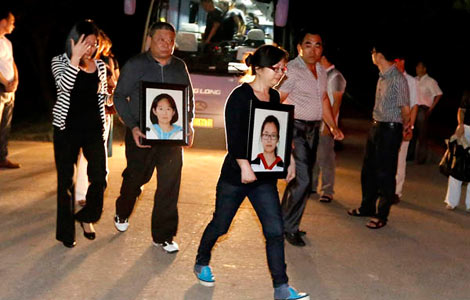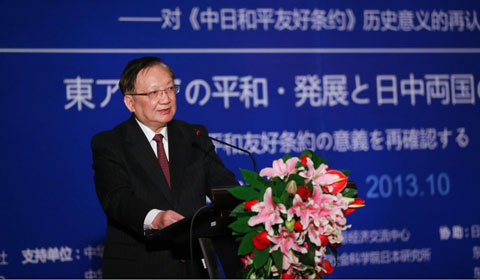Crewmembers give up much in service of their country
Updated: 2013-10-27 23:19
By Zhao Lei in Qingdao, Shandong province (China Daily)
|
||||||||
Crewmembers serving on Chinese nuclear submarines sacrifice their personal happiness in exchange for national security, while their family members say the servicemen bring honor to them.
"They owe a lot to their families, compromise their health and withstand psychological consequences brought about by the job on a nuclear submarine," said Qu Weiping, former political commissar of the People’s Liberation Army navy’s submarine base in Qingdao.
|
 |
Serving in a nuclear submarine means you must be able to accept a number of vocational hazards and deal with the high-pressure work, he said, adding that submariners also have to fulfill their oath to never talk about their work to anyone unless they have permission.
"I had always told my officers and sailors that each submarine they operate has a worth of several billion yuan and each of them is responsible for equipment worth tens of millions of yuan, so they must be up to the expectations of our motherland and the people."
The environment in a submarine operating underwater is so rigorous that people can hardly imagine it, said Senior Captain Liang Guilin, head of the base’s political department.
He said the temperature in some cabins in the submarine can be as high as 40 C while in other cabins it is as low as 7 C. In addition to extreme temperatures and high humidity, crewmembers also have to smell bad air that has a lot of toxic gases.
Qu said that after the Russian submarine K-141 Kursk sank in the Barents Sea in August 2000, the base saw a dramatic surge in letters and phone calls, with many relatives and friends of submariners trying to persuade them to quit the submarine force.
"I conducted a small survey that found a group of 150 crewmembers at my base received more than 1,700 letters in one month after the Russian boat’s tragedy. I guess most of them were to express concern or to ask the servicemen to quit.
"Seventeen officers were dumped by their girlfriends during the same month."
Starting in 2000, the base began to provide psychological training to crewmembers, making it among the first units in the navy to do so, Qu said.
He said servicemen at the base all are willing to endure personal sacrifices, noting that a number of talented people who have a diploma and could earn a lot of money in the private sector have given up attractive opportunities and dedicated themselves to the navy.
A total of 57 officers and technicians at the base have doctoral degrees, Liang said.
He added that there are nearly 20 officers who graduated from Peking and Tsinghua universities, the top two institutes in China whose graduates usually land the highest-paying jobs.
Wives said they are honored that their husbands are chosen to serve at one of the most important units in the military even though they have to accept the fact that their men often cannot be with them for a long time or help at home.
Shi Xuemei, a middle school teacher in Qingdao whose husband is an electrical and mechanical officer on a submarine, said: "In the first months of our marriage, I often asked him where he went and what he did when his boat set out on a patrol mission.
"Each time I asked such questions, he would rebuke me for wanting to know what I should not know, and gradually I got used to his periodic unexplained ‘disappearances’ since I know what he does is for the good of our nation and the people."
Senior Captain Wang Qing-jiang, who took part in a voyage that set a world record for the longest nuclear submarine patrol, said crewmembers had to overcome a host of difficulties before the historic undertaking could be accomplished.
"We used seawater to wash our bodies and sometimes used ultraviolet lamps to sanitize ourselves," he recalled.
Today the living conditions on a nuclear submarine have greatly improved, according to Commander Zou Pingyou, deputy political commissar of the 17th submariner unit.
"Compared to the past, it is much more convenient to take a shower on a nuclear submarine, and we have also ensured each crewmember can get access to enough fresh water," he said. Submariners also take health examinations before starting a voyage, he added.
Gao Feng, commander of the submarine base, said that though weapons, equipment and working conditions keep changing, generations of submariners share a same faith.
"No matter how many differences there are between old and new submariners, we hold the same beliefs, aspirations and persistence."
 Mother and four children stabbed to death in New York
Mother and four children stabbed to death in New York
 China Fashion Week S/S 2014: day 2
China Fashion Week S/S 2014: day 2
 Demonstrators protest against govt surveillance in US
Demonstrators protest against govt surveillance in US
 Where art thou, my love?
Where art thou, my love?
 Li Na reaches WTA Championships final
Li Na reaches WTA Championships final
 US sets Dec 10-11 hearing on Asiana plane crash
US sets Dec 10-11 hearing on Asiana plane crash
 Suggestions offered for Sino-Japanese ties
Suggestions offered for Sino-Japanese ties
 Health care site needs dozens of fixes
Health care site needs dozens of fixes
Most Viewed
Editor's Picks

|

|

|

|

|

|
Today's Top News
Mother and four children stabbed to death in NYC
China poses no danger to Russia: Medvedev
'Eldergartens' soothe China's aging pain
Cold snap to sweep NE, N China
Paper apologizes for reporter's untrue stories
Giving the mentally ill a voice - on radio
US tracked Merkel's phone since 2002 - report
China, Japan aiming for the win-win
US Weekly

|

|






